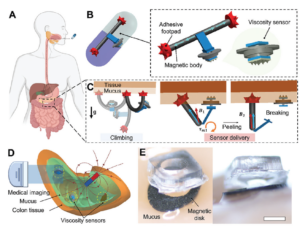
About the authors:
The first author is Boyang Xiao, a second-year Ph.D. student under the supervision of Prof. Xiaoguang Dong in the Department of Mechanical Engineering. The co-authors also include a group of Mechanical Engineering undergraduate students.
In their recent work published in Advanced Functional Materials, the team proposes a method to sense mucus viscosity in situ enabled by wireless miniature viscosity sensors actuated by magnetic fields and tracked by medical imaging. This work allows monitoring mucus viscosity continuously to help understand the development of disease and help identify efficient point-of-care treatment methods by providing frequent feedback information. Mucus has a viscosity ranging from 100 to 10,000 times the viscosity of water, which is an important biomarker for monitoring human physiological properties and early disease diagnosis. Particularly in the GI tract, compared with that in healthy people, mucus viscosity is evidently different for patients with peptic ulcer, inflammatory bowel disease (IBD) and unbalanced gut microbes. Mucus viscosity will also increase when viscous and thick mucus is built up for patients with Cystic Fibrosis due to genetic problems. The proposed minimally invasive robotic delivery and viscosity sensing method thus paves the way towards sensing biofluid properties deep inside the body for future disease monitoring and early diagnosis functions.